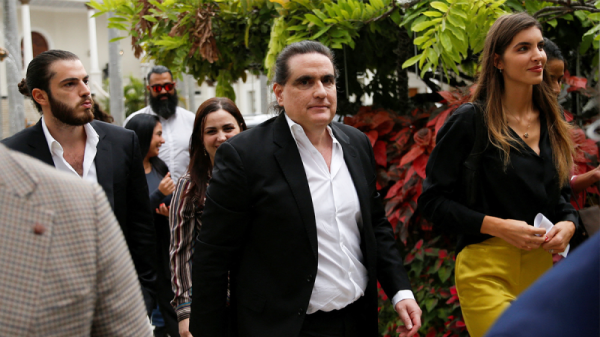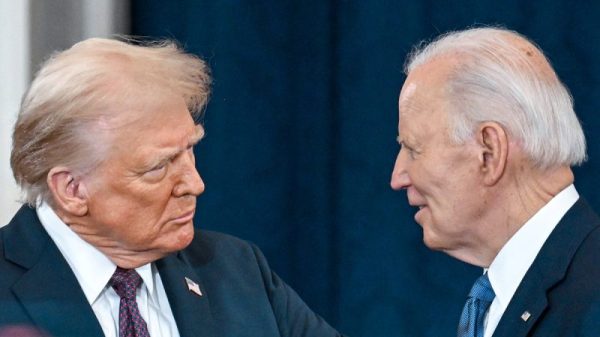Prosecutors working with special counsel Jack Smith on Thursday urged U.S. District Judge Tanya S. Chutkan to refuse a request by Donald Trump’s attorneys that she disqualify herself from his federal election obstruction case, saying Trump’s team had failed to supply evidence that she was biased against him.
“The defendant has failed to identify anything approaching the clear and convincing evidence necessary to overcome the presumption of impartiality,” prosecutors said in the filing, accusing Trump of relying on “suggestion and innuendo to insinuate something sinister in the Court simply doing its job by addressing sentencing arguments.”
Trump’s defense on Monday asked for Chutkan’s recusal, saying the veteran jurist appeared to have prejudged the former president’s guilt.
The defense motion came after Chutkan set a March 4 trial date for Trump, who has pleaded not guilty to a four-count indictment accusing him of illegally plotting to overturn Joe Biden’s 2020 election victory. Before the special counsel investigation began, while sentencing people who took part in the Jan. 6, 2021, riot, Chutkan twice noted that Trump and other leaders claiming the election was stolen had not been charged with crimes.
Even if Chutkan may genuinely believe that she can give Trump a fair trial, the “public will reasonably and understandably question whether Judge Chutkan arrived at all of her decisions in this matter impartially,” Trump attorney John F. Lauro wrote in the recusal motion. He said the comments “unavoidably taint” her handling of the case, and that “the law and the overwhelming public interest in the integrity of this historic proceeding require recusal.”
History of investigations involving Donald Trump
1/7
End of carousel
Lauro quoted Chutkan from a December 2021 sentencing hearing, before Trump was under active investigation, telling a rioter, “The people who may be the people who planned this and funded it and encouraged it haven’t been charged.” Chutkan went on to say at that hearing: “The issue of who has or has not been charged is not before me. I don’t have any influence on that. I have my opinions, but they are not relevant.” She did not name Trump. In October, she told another rioter that he and other people in the Capitol mob “were there in fealty, in loyalty, to one man — not to the Constitution,” adding, “It’s a blind loyalty to one person who, by the way, remains free to this day.”
Lauro called those statements “an apparent prejudgment of guilt” that should be disqualifying.
Legal analysts said views that a judge expresses at the sentencing of one defendant usually cannot be the basis for recusing them in the case of a different defendant, as that is the basis of their job, and they are trusted to not let their views bias them against other defendants.
A unanimous U.S. Supreme Court ruled in 1994 that a judge must recuse from a case based on “opinions formed” through court proceedings only if those opinions “display a deep-seated favoritism or antagonism that would make fair judgment impossible.”
The law leaves it up to the judges themselves to decide after hearing from both sides. Chutkan gave Trump’s defense until Sunday to make any reply. If Chutkan refuses the request, Trump’s defense lawyers may ask the U.S. Court of Appeals for the D.C. Circuit to disqualify her.
Chutkan, 61, was appointed in 2014 by Barack Obama and is one of 13 active judges in the federal trial court in Washington. All have presided over dozens of cases involving participants in the Capitol attack, which has led to charges against more than 1,100 people. Many judges, appointed by presidents of both parties, have made comments similar to Chutkan’s, as rioters have frequently argued that they were misled by Trump.
Trump has made similar recusal requests before, including in New York, where he is scheduled for trial in March for allegedly falsifying business records in connection to hush money payments during the 2016 presidential campaign.
New York Supreme Court Justice Juan Merchan last month denied Trump’s motion, which was based on the judge’s past political donations and his daughter’s work for anti-Trump organizations.
In addition to the cases in New York and D.C., Trump is separately charged in state court in Georgia with attempting to obstruct the election results in that state, and in federal court in Florida with mishandling classified documents after leaving the White House. He has pleaded not guilty in all four cases.
Prosecutors working with special counsel Jack Smith on Thursday urged U.S. District Judge Tanya S. Chutkan to refuse a request by Donald Trump’s attorneys that she disqualify herself from his federal election obstruction case, saying Trump’s team had failed to supply evidence that she was biased against him.
“The defendant has failed to identify anything approaching the clear and convincing evidence necessary to overcome the presumption of impartiality,” prosecutors said in the filing, accusing Trump of relying on “suggestion and innuendo to insinuate something sinister in the Court simply doing its job by addressing sentencing arguments.”
Trump’s defense on Monday asked for Chutkan’s recusal, saying the veteran jurist appeared to have prejudged the former president’s guilt.
The defense motion came after Chutkan set a March 4 trial date for Trump, who has pleaded not guilty to a four-count indictment accusing him of illegally plotting to overturn Joe Biden’s 2020 election victory. Before the special counsel investigation began, while sentencing people who took part in the Jan. 6, 2021, riot, Chutkan twice noted that Trump and other leaders claiming the election was stolen had not been charged with crimes.
Even if Chutkan may genuinely believe that she can give Trump a fair trial, the “public will reasonably and understandably question whether Judge Chutkan arrived at all of her decisions in this matter impartially,” Trump attorney John F. Lauro wrote in the recusal motion. He said the comments “unavoidably taint” her handling of the case, and that “the law and the overwhelming public interest in the integrity of this historic proceeding require recusal.”
History of investigations involving Donald Trump
1/7
End of carousel
Lauro quoted Chutkan from a December 2021 sentencing hearing, before Trump was under active investigation, telling a rioter, “The people who may be the people who planned this and funded it and encouraged it haven’t been charged.” Chutkan went on to say at that hearing: “The issue of who has or has not been charged is not before me. I don’t have any influence on that. I have my opinions, but they are not relevant.” She did not name Trump. In October, she told another rioter that he and other people in the Capitol mob “were there in fealty, in loyalty, to one man — not to the Constitution,” adding, “It’s a blind loyalty to one person who, by the way, remains free to this day.”
Lauro called those statements “an apparent prejudgment of guilt” that should be disqualifying.
Legal analysts said views that a judge expresses at the sentencing of one defendant usually cannot be the basis for recusing them in the case of a different defendant, as that is the basis of their job, and they are trusted to not let their views bias them against other defendants.
A unanimous U.S. Supreme Court ruled in 1994 that a judge must recuse from a case based on “opinions formed” through court proceedings only if those opinions “display a deep-seated favoritism or antagonism that would make fair judgment impossible.”
The law leaves it up to the judges themselves to decide after hearing from both sides. Chutkan gave Trump’s defense until Sunday to make any reply. If Chutkan refuses the request, Trump’s defense lawyers may ask the U.S. Court of Appeals for the D.C. Circuit to disqualify her.
Chutkan, 61, was appointed in 2014 by Barack Obama and is one of 13 active judges in the federal trial court in Washington. All have presided over dozens of cases involving participants in the Capitol attack, which has led to charges against more than 1,100 people. Many judges, appointed by presidents of both parties, have made comments similar to Chutkan’s, as rioters have frequently argued that they were misled by Trump.
Trump has made similar recusal requests before, including in New York, where he is scheduled for trial in March for allegedly falsifying business records in connection to hush money payments during the 2016 presidential campaign.
New York Supreme Court Justice Juan Merchan last month denied Trump’s motion, which was based on the judge’s past political donations and his daughter’s work for anti-Trump organizations.
In addition to the cases in New York and D.C., Trump is separately charged in state court in Georgia with attempting to obstruct the election results in that state, and in federal court in Florida with mishandling classified documents after leaving the White House. He has pleaded not guilty in all four cases.





















